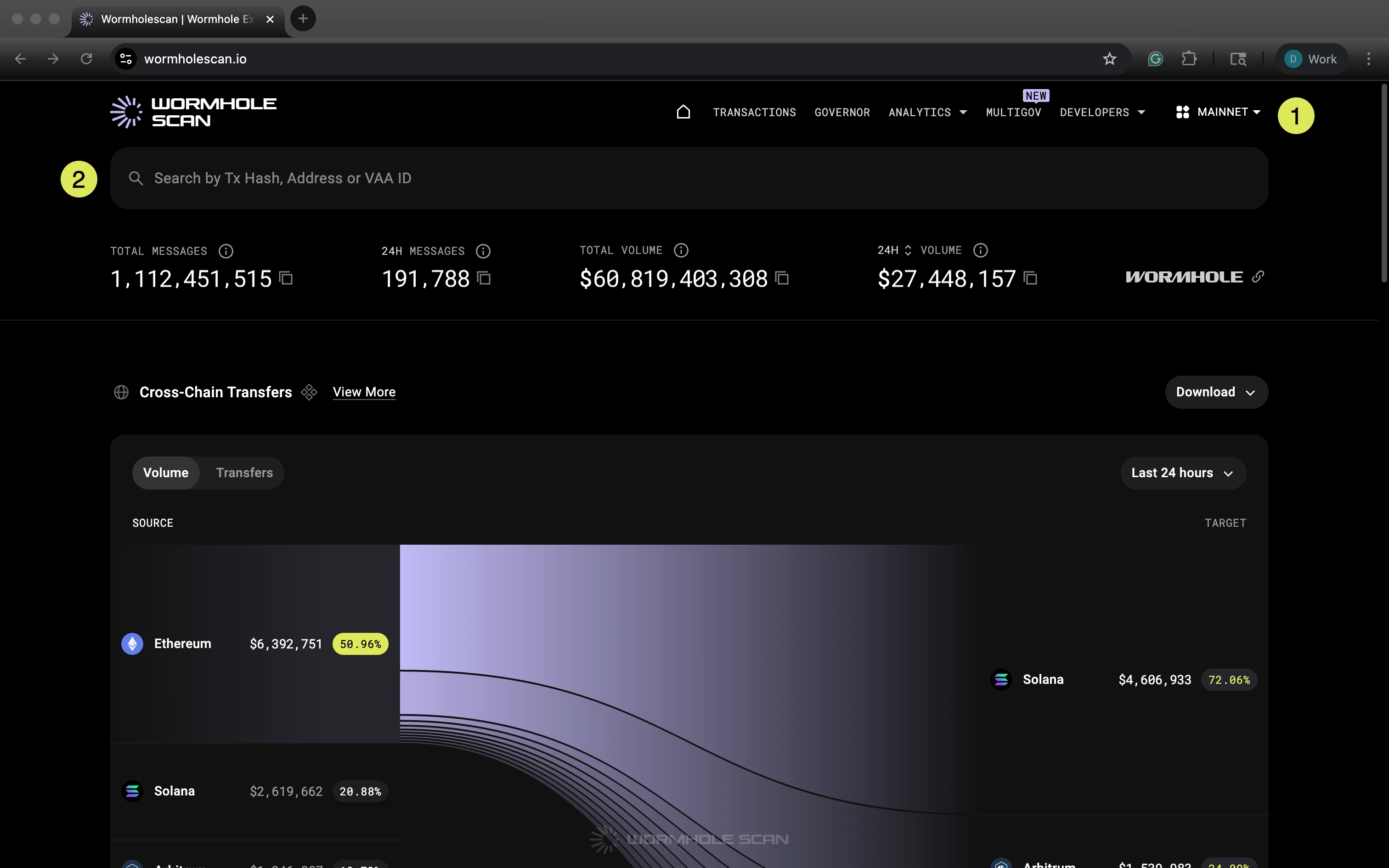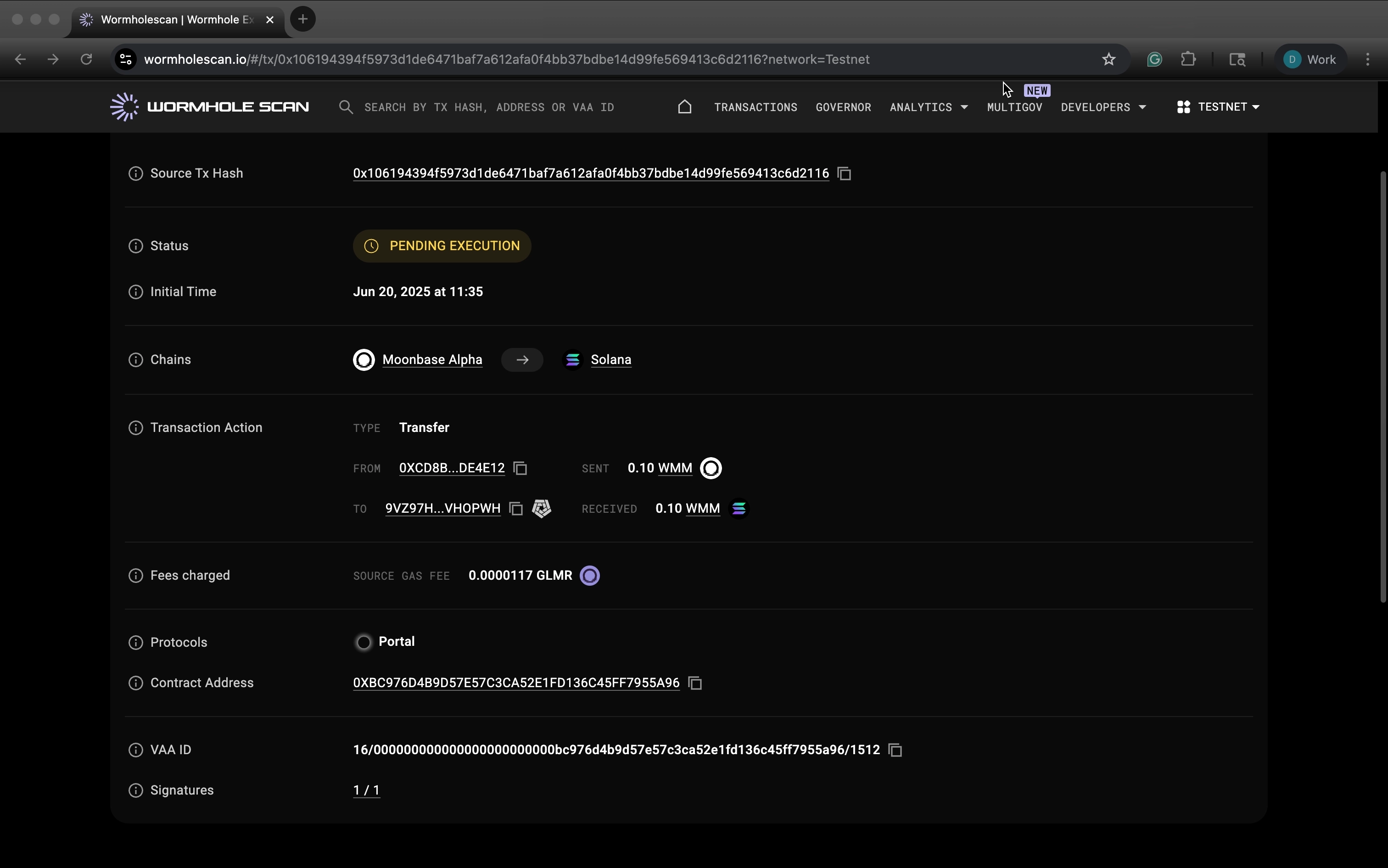Fetch a Signed VAA#
This guide demonstrates how to fetch a signed Verified Action Approval (VAA), first programmatically using the TypeScript SDK, then manually using the Wormholescan explorer. VAA retrieval is a key step in manual messaging and transfer flows. Knowing how to locate a relevant VAA can also help with debugging and monitoring transactions while building out your integration.
Prerequisites#
Before you begin, ensure you have the following installed:
- Node.js and npm
- TypeScript (installed globally)
Set Up Your Developer Environment#
Follow these steps to initialize your project, install dependencies, and prepare your developer environment:
-
Create a new directory and initialize a Node.js project using the following commands:
-
Install dependencies, including the Wormhole TypeScript SDK:
Fetch VAA via TypeScript SDK#
Follow these steps to search for and retrieve a VAA using the TypeScript SDK:
-
Create a new file called
fetch-vaa.tsusing the following command: -
Open your
fetch-vaa.tsfile and add the following code:fetch-vaa.tsimport { wormhole } from '@wormhole-foundation/sdk'; import evm from '@wormhole-foundation/sdk/evm'; import { serialize } from '@wormhole-foundation/sdk-definitions'; import { toChainId } from '@wormhole-foundation/sdk-base'; async function main() { // Initialize the Wormhole SDK with the network and platform // to match the source chain for the transaction ID const wh = await wormhole('Testnet', [evm]); // Source chain transaction ID for the VAA you want to fetch const txid = 'INSERT_TRANSACTION_ID'; // Call getVaa to fetch the VAA associated with the transaction ID // and decode returned data into a human-readable format const vaa = await wh.getVaa(txid, 'Uint8Array', 60000); if (!vaa) { console.error('❌ VAA not found'); process.exit(1); } const { emitterChain, emitterAddress, sequence } = vaa; const chainId = toChainId(emitterChain); const emitterHex = emitterAddress.toString(); const vaaBytes = serialize(vaa); const vaaHex = Buffer.from(vaaBytes).toString('hex'); console.log('✅ VAA Info'); console.log(`Chain: ${chainId}`); console.log(`Emitter: ${emitterHex}`); console.log(`Sequence: ${sequence}`); console.log('---'); console.log(`VAA Bytes (hex):\n${vaaHex}`); // Return the VAA object for further processing if needed return vaa; } main().catch(console.error);This code does the following:
- Initializes a Wormhole instance with the same
networkandplatformas the source chain transfer transaction. - Accepts the transaction ID from the source chain transfer transaction.
- Prints the associated
chain,emitter,sequence, and VAA bytes to the terminal. - Returns the
vaaobject for any further processing.
- Initializes a Wormhole instance with the same
-
Run the script with the following command:
-
You will see terminal output similar to the following:
npx tsx fetch-vaa.ts ✅ VAA Info Chain: 16 Emitter: 0x000000000000000000000000bc976d4b9d57e57c3ca52e1fd136c45ff7955a96 Sequence: 1512 --- VAA Bytes (hex): 010000000001004d34d189b894acf4c16b9f456f908ca8b60aa9b2fa77cfa6ebc18f864818c21a7e18b6c4f72415f441be4d2b666c5b897d354cec0e950b935b15806d002d39670168557fb6000000000010000000000000000000000000bc976d4b9d57e57c3ca52e1fd136c45ff7955a9600000000000005e8010100000000000000000000000000000000000000000000000000000000009896800000000000000000000000009b2ff7b2b5a459853224a3317b786d8e85026660001084b1e2f8a26ddff1a55eed46add73a9b556256f2afda1072f6cfdab1dcb2d53000010000000000000000000000000000000000000000000000000000000000000000
Fetch VAA via Wormholescan#
You can also use Wormholescan's UI to manually search for a VAA using the source transaction ID, VAA ID, or a wallet address. This type of quick search is helpful during debugging or testing of your integration. Follow these steps to fetch a VAA using Wormholescan:
-
On Wormholescan, use the dropdown menu in the top right corner to select either Mainnet or Testnet.
-
Enter your transaction ID in the search bar and select "return" or "enter" to submit your search request. Alternatively, you can enter the wallet address of the transaction signer and return any transactions under that account.
-
Inspect the returned search results. Note that the source transaction ID, current status, transaction details, and the VAA ID are included.
Congratulations! You've now fetched a signed VAA using both the TypeScript SDK and Wormholescan UI. These skills are valuable when developing manual transfer or messaging processes, as well as debugging and testing an integration build.

